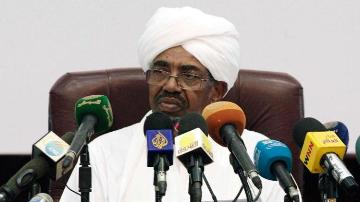Sudan’s Bashir defends RSF militias, says elections to be held on time
July 13, 2014 (KHARTOUM) – Sudanese president Omer Hassan al-Bashir has renewed a promise to end rebellion and tribal conflicts in the country by the end of 2014, while also denouncing criticism directed at the Rapid Support Forces (RSF) from some political groups.

He further strongly defended the RSF, saying they defeated rebel groups in several areas in Darfur and South Kordofan.
“They [RSF] offered 163 martyrs and several of wounded within five months only to defend the country,” he added.
The Sudanese president denounced criticism of the RSF by some political forces, saying the latter turned a blind eye on the violations committed by the rebel forces in the localities of Haskanita, Al-li’ait Jar Alnabi, Altiwaisha, and Kalmando in North Darfur.
The RSF militia, which is widely known as the Janjaweed militias, were originally mobilized by the Sudanese government to quell the insurgency that broke out in Sudan’s western region of Darfur in 2003.
The militia was reactivated and restructured again in August 2013 under the command of NISS to fight rebel groups in Darfur region, South Kordofan and Blue Nile states following joint attacks by Sudanese Revolutionary Front (SRF) rebels in North and South Kordofan in April 2013.
Sudanese authorities arrested leaders of two opposition parties recently after accusing the RSF of committing serious abuses in conflict zones.
ELECTIONS ON TRACK
The Sudanese president on Sunday also directed the National Elections Commission (NEC) to make the necessary arrangements for holding elections in April 2015, saying it is a constitutional requirement and there is no reason for delaying it.
Sudan’s opposition parties call for forming a transitional government and holding a national conference with the participation of rebel groups to discuss a peaceful solution for the conflicts in Darfur region, South Kordofan, and Blue Nile states.
The interim government would organize general elections once a political agreement on constitutional matters is reached, inaugurating a new democratic regime. But the NCP rejects this proposal saying opposition parties must simply prepare for the 2015 elections and that rebels should sign first peace accords.
Last week, Bashir issued presidential decrees appointing NEC chief, deputy chairman, and two other members.
The Sudanese parliament also passed amendments to the 2008 elections law amid accusations by opposition that the government plans to rig the election process through the new law.
Bashir said the amended electoral law would allow all political forces to be presented in the parliament.
Under the amended law, the percentage of proportional representation according to the draft bill went up from 40% to 50% with an increase in the minimum allocated for women from 25% to 30% and for the party representation list from 15% to 20%.
Bashir underscored commitment to widen the circle of political practice and allow public freedoms according to the law and without infringing on the rights of other people and public rights.
He called upon MPs to focus on resolving problems facing Sudan on top of which are the tribal conflicts which is fuelled by the enemies of the country.
Bashir renewed Sudan’s adherence to its principles, saying the country was targeted since a long time ago due to its geographical location.
(ST)
